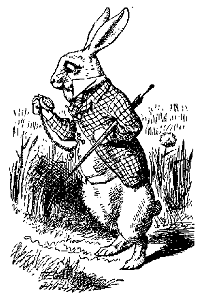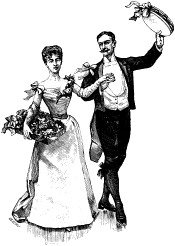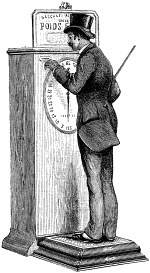|
Issue of April 10, 2007 |
 |
|
Issue of April 10, 2007 |
 |
|
Readme: Spring has sprung, the grass has riz, I wonders where the birdies is... rats, it's snowing again. You know, we say that the month of March is good for nothing and should be abolished. (We do say that, don't we? I'm sure I learned that in school.) But on the evening of March 27 this year, that miserable excuse for a month redeemed itself when this website (The Word Detective. Please pay attention.) snagged its two millionth unique vistor (i.e., not counting repeat visitors). And that's counting only since 1999, four years after the site went online. That, to put it in marketer-speak, is a lot of eyeballs. Now I know how Sally Field felt at the Oscars. Naturally, I was completely oblivious to the approach of this milestone, and it was only because reader Dave Aton emailed me that evening that I was able to actually witness the counter rolling over. In celebration of this momentous occasion, we here at TWD World Headquarters are making available, in a limited edition of [however many anyone wants to buy], this:
Onward. As I mentioned last month, I'm trying a little experiment. All of this month's columns are also posted at The Word Detective Annex, a WordPress blog I have set up as a place for readers to leave comments on the columns. There is some sort of registration required to slow down the spammers, but it's not onerous. I've posted links from the foot of each column here directly to its equivalent at the blog, so just click to leave your comment or read those of others. Of course, the circus rolls on at da other blog. And now, on with the show:
Dear Word Detective: I ran into an old high school chum recently and was flattered when he said what he remembered from the old days was that I was always neatly dressed: "In fact, you always looked as though you had just stepped from a band box." I think I knew what he meant but I wondered where that expression came from. I have heard it many times so I know he didn't just make it up. -- John D. Wilson. 
Well, you're ahead of me. I had never heard that expression before I received your question. Nevertheless, my mind, which tends to wander off if not watched closely, immediately concocted its own explanation. It seemed logical that the "band box" in question might be one of those gazebo-like park bandstands one sees in idealized Hollywood renditions of small town life in the 19th and early 20th century. Assuming those movies are accurate (which is, granted, akin to assuming that "King Kong" was a documentary), the bands performing in the "band box" were always neatly dressed in matching striped seersucker blazers and straw boater hats, making them a handy standard of neatness in dress. Nice theory, isn't it? Too bad it has nothing to do with the actual origin of "to look as if one came out of a bandbox," which has meant "to appear very neat and fashionable" since the early 19th century. The "bandbox" in the phrase is not a gazebo, but what today we would probably call a "hat box," a thin-walled circular cardboard box used for the storage of delicate hats. The term "bandbox" itself actually dates back to the early 17th century, and the "band" in the word is neither a musical group nor the band often found on today's hats. At that time, a standard article of fancy dress for both men and women was a "ruff" or elaborately ruffled collar (see here for pictures of ruffs), also called a "band" and often stiffly starched and up to a foot in diameter. The "bandbox" was invented to store these delicate "bands," and later used, as fashion changed, to protect equally delicate hats, celluloid collars, and the like. Thus, to say that someone "looks as if he just stepped from a bandbox" means that he is dressed as if his clothes were fashionable and meticulously neat, and, by extension, that he is quite a dapper fellow.
Dear Word Detective: A couple years ago I was reading Maya Angelou's "I Know Why The Caged Bird Sings," in which she tells of, as a young girl, being reprimanded by her grandmother for using the phrase "by the way." Her grandmother said that this was "taking the name of the Lord in vain." I'd never heard such an interpretation. Any thoughts? -- Andrew C. Buckland.
This is the point at which I admit that I have never read the book in question. But I assume that Angelou's memory is accurate and her grandmother actually believed that "by the way" was a form of blasphemy (from the Greek "blasphemein," to speak evil of), which the American Heritage Dictionary defines as "a contemptuous or profane act, utterance, or writing concerning God or a sacred entity." The remedy throughout history for blasphemy, given that human beings are perennially fond of expressing strong feelings through swearing and oaths, has been the concoction of euphemisms (from the Greek "euphemizein," to speak pleasantly), superficially inoffensive words that serve as stand-ins for the forbidden. Euphemisms probably don't fool the relevant deity, but they do spare the sensibilities of the easily offended. Often, in fact, euphemisms eventually become so established that speakers are unaware that the words began as euphemisms. For instance, "gosh," "golly," and the "grief" in "good grief" all began as euphemisms for "God." In the case of "by the way," it appears that Angelou's grandmother was looking for blasphemy-concealed-by-euphemism where none existed. "Way," with the basic meaning of "road or path," dates back to the Old English "weg," and "by the way" has been used as a prepositional phrase meaning literally "alongside the road" since the 9th century. The figurative use of "by the way" to mean "incidentally" (as if "by the side" of the main route of the conversation) has been common since the 16th century, and has never had a religious subtext. My guess is that Angelou's grandmother was familiar with "the Way" used to mean Christ's teachings (a usage found numerous times in the Bible) and had jumped to the conclusion that "the way" in "by the way" is a sneaky way of swearing an oath using Christ's name. It isn't.
It was the best of times, it was ... KAPOW! Dear Word Detective: Our seven year-old daughter asked me this morning "why cartoons are called 'cartoons.'" I, of course, could not answer this question. We were wondering if you could solve our dilemma and answer that question for us. -- John and Abigale Divozzo.
I'm actually a bit surprised that cartoons are still called "cartoons." There are people, I have lately discovered, who personally resent, and are not shy about saying so, the venerable term "comic book." Apparently once a comic book reaches a certain page count, it is now properly known as a "graphic novel." I know this because our local Barnes & Noble recently ripped out an entire section of old-style novels (the kind with line after line of boring old type) and replaced them with "graphic novels." Sic transit Madame Bovary. Presuming these things eventually end up on school reading lists (a fair bet), what do you suppose the Cliff's Notes for them will look like? Onward. There are two kinds of "cartoons," of course: the static drawings found on editorial pages and in comic strips, and the moving kind (now often known, apparently inevitably, as "animated features") shown on TV and in movie theaters. The moving kind of "cartoons" take their name from the static drawings, but the use of "cartoon" to mean a humorous or topical drawing published in a magazine or newspaper dates only to the mid-19th century. Prior to that time, a "cartoon" was a preliminary sketch made on heavy paper by a serious artist, the word being derived from the Italian "cartone," based in turn on the Latin "charta," meaning "writing paper" (which also gave us our English words "chart," "card" and "charter," among others). Thus, in this sense, major artists of the stature of Leonardo da Vinci and Raphael ("But the sight best pleased me was the cartoons by Raphael, which are far beyond all the paintings I ever saw," 1878) produced what are now some very valuable "cartoons."
Dear Word Detective: The desperate urge to find out the origins of words often creeps up on me, but I can usually work it out myself with the help of dictionaries or your excellent column. However, it recently it suddenly crossed my mind (as it does) that I didn't know why odd and even numbers were called that. "Even," OK -- smooth, level, equal, etc. -- but "being divisible by two" didn't seem to come up with "even." And as for "odd," there's nothing odd about 3, 5 or 7, any more than 2, 4 or 6, they are just as useful. And, oddly, there is no etymology for "odd" in my dictionaries. Can you help? -- David, Ripon, North Yorkshire, England.  So, you're saying there's something odd about "even"? "Odd" seems quite a bit odder than "even" to me. Not as odd as otters, of course. Then there are the woodchucks chucking. It's a wonder I ever get any work done around here. But I dare you to stare at "odd" for a while and not begin to wish you spoke some other language. It's a seriously weird little word. Before we get too far into this question, I should explain that I do not understand mathematics. Period. I once had a moment of absolute clarity in ninth grade when I thought I finally understood trigonometry. But the moment lasted all of fifteen minutes, and I've been abysmally innumerate ever since. This is relevant because explaining "odd" and "even" necessarily involves a smidgen of math. Both "odd" and "even" are extremely old words. "Even" harks back to the ancient Germanic root "ebnaz." It's not known whether that root meant "equal, the same" or "flat or level," the two primary meanings of "even" today, but when "even" first appeared in Old English, it carried the primary sense of "level, not sloping." The application of "even" to numbers as the opposite of "odd," oddly enough, dates only to the middle of the 16th century. The sense is that an "even" number of things, divided by two, would create two equal amounts with no difference -- no slope, so to speak -- between them. "Odd" comes from the old Scandinavian root meaning "triangle," which led to the Old Norse "oddi" having the sense of "three" (as in sides of a triangle), which evolved into a word applied to an "extra" element added to a pair or the "odd man" who might break a tie vote. The mathematical meaning comes, again, from division by two, which in the case of an "odd" number, results in one being left over and the two parts not being "even." The use of "odd" to mean "strange" or "unusual" stems from this sense of an "outsider" that doesn't neatly fit in.
Dear Word Detective: I checked your alphabetical listing of words past but it didn't help. The main problem is that I don't know how the word would be spelled. I used to hear this term a lot as a youngster in the 1970's (I believe it was even used in a blue jean commercial at the time), and heard it in "The Drew Carey Show" once in the last 5 years, but I'm considering reviving the word. The word is "skosh" (long o), and it means "a bit" or "a tad," as in "a skosh more room in the seat of those jeans." Do you have any history on the origins of this fun term? -- Micki Morrison.
Now all I have to do is pull back the curtain and reveal the answer, which fortunately turns out to be easy in this case. "Skosh," meaning "a little bit," is derived from the Japanese word "sukoshi," which means "a little amount" or "a few." The Anglicized form "skosh" first appeared in the US in the early 1950s (the first printed citation in the Oxford English Dictionary is from 1955), and it's likely that the term was imported by US service personnel serving in Japan either in the period of American occupation after World War II or during the Korean War. The word is usually pronounced, as you say, with a long "o." Interestingly, in the Japanese "sukoshi," the "u" is not voiced, so the English pronunciation is remarkably close to the Japanese. You're also correct about hearing "skosh" used in a TV commercial, one that ran in the late 1970s for the then-new Levis for Men, which featured a "skosh more room" in the seat for the increasingly pear-shaped US couch-potato demographic. Mercifully, most of those guys had stopped wearing bell-bottoms by then.
Dear Word Detective: I have a vague recollection from my high school days of one of my profs saying that the term "understanding" is derived from the Greek myth of Atlas, who was punished by being made to hold up the weight of the world on his shoulders, and in so doing heard all the many sufferings of humanity, i.e., he came to "understand" the world. Is that in fact the case, or have I (or my former prof) been misinformed? I have done some research, but have yet to find a resource to support the claim. -- Stephen.
But the story of Atlas that your teacher recounted does highlight the very real puzzle at the core of our English word "understand" -- how did a word which appears to mean "stand beneath" or "support" come to mean "comprehend"? The real answer is that the prefix "under" in "understand" is not our normal "beneath" kind of "under" as found in "underground" or "undermine." The "under" in "understand," although spelled just like the other "under," comes from an entirely different Indo-European root word, one that carried the sense of "between or among." When "understand" first appeared in Old English (as "understandan"), it carried the meaning of "comprehend, grasp the idea or details of something," but literally meant "to stand among or amidst" something, and thereby be familiar with it. One minor mystery is why the Old English "understandan" was carried over into our modern English while a more logical candidate, the Old English "forstand," was not. "Forstand" meant literally "to stand before or on top of" and also carried the sense of "comprehend" (much as we say we are "on top of" a situation today). The answer is, as usual, that our modern English is the product of a committee consisting of many millions of people chattering away over the course of many centuries, and the result is often less than logical.
|
All contents Copyright © 2007 by Evan Morris.